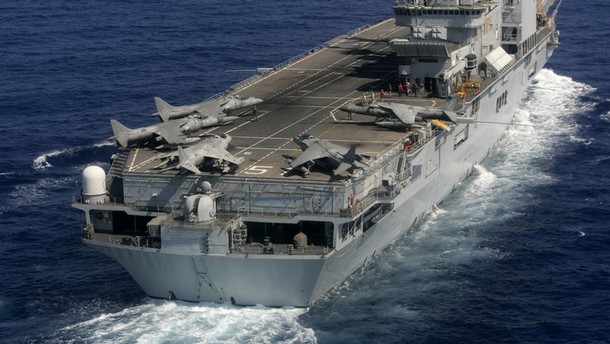
From Paul Richter, the Los Angeles Times: The French and Italians have sent their aircraft carriers home. The British have withdrawn their spy plane. Canada is pulling out air crews. The Danes are running out of bombs. And the Norwegians have dropped out entirely.
As their Libyan rebel allies finally are showing progress on the battlefield, members of the NATO alliance are scraping and scrounging these days to keep the five-month air campaign against Moammar Kadafi’s government aloft long enough to make it to the finish line. . . .
With all the governments struggling to cut budgets, member countries are scrambling for savings, and in some cases begging or borrowing aircraft and munitions. Some are considering taking a "pause" in their participation.
"These pressures are real; they’re building. You can be sure we don’t want this to go on a day longer than it has to," said a senior NATO official who declined to be identified because of the sensitivity of the issue. . . .
British, French and American officials now say Kadafi could stay in Libya after giving up power if the rebels advancing on Tripoli agree. But this formulation poses a risk, U.S. officials acknowledge, because of the possibility he will continue to exert a strong influence on a future government.
"They changed the definition of winning — they moved the goal posts," said Jorge Benitez, who studies NATO at the Atlantic Council, a nonprofit public policy group in Washington. The shift shows that "they feel they’ve got to end this as soon as possible."
For now, NATO officials say they will stay the course, noting that the number of airstrikes against Kadafi’s military forces and command facilities has not diminished — in part because the British, French and Americans are picking up the slack. . . .
The Pentagon has chiefly provided surveillance, intelligence-gathering, air refueling and other logistical support rather than conducting manned combat missions since the air war began in March.
But the Pentagon has added Predator drones, refueling planes and attack aircraft designed to suppress fire from antiaircraft batteries and other air defenses. The U.S. also has helped replenish other countries’ inventories of "smart" bombs and other munitions, say NATO officials.
Benitez, from the Atlantic Council, said the Pentagon’s growing use of drones and strikes against air defense units means that the Pentagon is now the second-largest player in the air war, racking up 16% of strike sorties.
NATO officials have requested more help from several member countries now playing little or no role, a group that includes Spain, Germany and Poland.
The alliance has been "forgiving when the smaller countries decide there are limits to what they contribute," said Kurt Volker, who was U.S. ambassador to NATO during the George W. Bush administration. (photo: Getty)
Image: getty%207%207%2011%20Giuseppe%20Garibaldi%20Italian%20carrier_0.jpg
